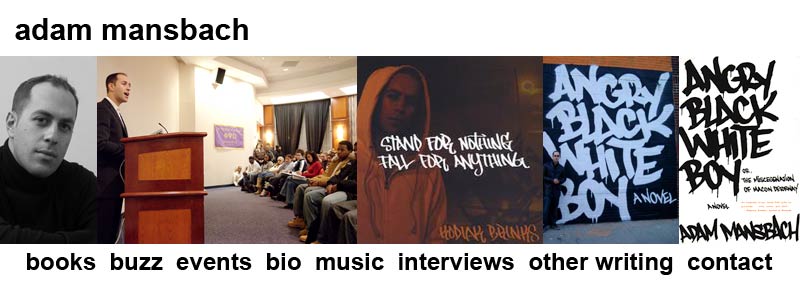
|
||
| Here’s the thing about the new Eminem album: the shit is kinda boring. If this was some new-jack’s debut, instead of the latest installment in an eight-year saga of personal growth and adolescent relapse, rage and insight, race and class, then Encore would not make him a star. He’d get props for his lyrical agility, his wit and range and, occasionally, depth. But if this was the first we’d heard from Em, he wouldn’t captivate us like he did when he was lonely and hungry and hell-bent on pissing off the world -- when he was committed to raising not just that ubiquitous middle finger, but the lyrical stakes and some damn good points about what it’s like to grow up white, broke and American as well. Back then, the three-part Freudian harmony of Eminem, Slim Shady, and Marshall Mathers was gripping and hilarious -- largely because it was so hard to determine just where one persona ended and the next began, which threats and boasts and pleas for help to take to heart. No pop artist has ever engaged his critics as cagily as Eminem: always pushing the envelope, always anticipating the response and rendering it obsolete with his next semantic shake-and-bake. You were a sucker if you took him seriously. But if you decided it was just a game, your ass was done. There are three problems with Encore. The first is obvious, which is why Em hints at it himself: “there goes poor Marshall again/whining about his millions and his mansion and/his sorrow he’s always drowning in”. In other words, what’s the Angry Blonde got left to be mad at, and how long can he draw inspiration from a past we’ve already heard all about? There’s more at stake than just complacency, though. In fighting to establish himself as a white rapper -- and changing the entire conversation about race in hip hop in the process, by being the first whiteboy whose mic skills were a given and thus allowing everybody to move on and argue over what that meant -- Eminem posited that race is trumped by class. Peep the climax of his bio-pic 8 Mile, for example: Em’s poor, white character triumphs by exposing his black rival as a middleclass private-school kid. But unlike race, class is mutable, and it tends to change when you sell twenty gajillion records. For most rappers, that’s something to ignore, but Eminem is too conflicted, too aware of the scrutiny he’s under, to go that route. So he puts it on the table, and then offers, amazingly, a fresh look at his childhood. “Yellow Brick Road” is half-narrative, half-sociology, and all insight. Em recounts how the emergence of the group X-Clan set off an Afrocentric fashion trend that he didn’t know enough not to try to imitate, and apologizes for an early (and recently unearthed) freestyle on which he disses black women. Em is at his serious-sensitive best (as opposed to his witty-asshole best) discussing race; he’s always been grateful to black culture for taking him in, and bothered by the suspicion that his success is due to his whiteness. Race is the one card Slim Shady will never play: gay jokes and wife-killing anthems, sure, but the cosmology of Em’s universe prohibits having fun with melanin. On “Like Toy Soldiers,” a reasoned account of the Ja Rule beef, Eminem again sounds like a straight-up adult. Which only makes the fart noises, potty-mouth, and silly-fits of tracks like “Puke” (another rant against his ex-wife) and “My 1st Single” all the more disposable. Encore’s second problem is that Eminem and Slim Shady don’t really talk anymore: one’s all grown up, and does tracks like “Mosh,” a searing indictment of Bush and the war in Iraq. The other retaliates by regressing, and making the stupidest music of his career. He seems bored and resentful about it; “Rain Man” end with the lines “I don’t even gotta make no goddamn sense/I just did a whole song and I didn’t say shit.” It doesn’t come off as cavalier so much as apologetic. But at the end of the day, it’s Slim who’s paying the bills, not Em: gotta keep the fourteen-year-olds chortling and the conservatives shocked. He does it, but the glee is gone, and the vitriol is forced if it’s there at all. Even at his laziest, Eminem is a superlative lyricist, but Encore is proof that there’s more to being an MC -- especially an MC-as-cultural-phenomenon -- than just flow and wordplay. Which brings us to problem three, which many may regard as problem one: the beats, son, the beats. Half are by Em and half by the good Dr. Dre, and they’re mostly predictable and plodding. Em favors a sparse production style (when he’s not bugging out and jacking Heart’s “Crazy For You,” anyway), one that doesn’t compete with his lyrics. Dre, who’s seldom taken a misstep in 20 years of beatmaking (okay, fine, JJ Fad), follows his protege’s lead, and the result is that too often there’s not enough going on. Encore’s got some nice bumps, but nothing approaches the bouncing, delirious funk of “Hi, My Name Is...” off the Slim Shady LP, or the subversive stutter-step genius of “Kill Me” from the Marshall Mathers album. So should you buy Encore? If you’re an eighth grade jackass, yes. If “Mosh” got your hopes up and you’re thinking Em’s turned a corner and is more interested in spurring American regime change than fucking with Christopher Reeves and Michael Jackson and pretending he’s gay, you’ll be disappointed. There are some moments of real depth here, and some fun ones too. But to reach them you’ve got to clamber past the disinterested, borderline-corny salvos of an edgeless Eminem. Considering what he’s capable of, that’s so depressing you’ll wish he was sharp enough to cut your wrists against.
|
||